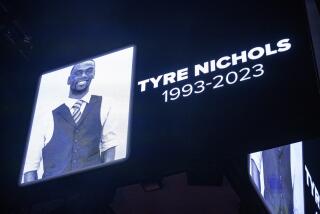Woman testifies about placating kidnapper
- Share via
ATLANTA — The troubled suburban widow who was kidnapped by alleged courthouse shooter Brian Nichols took the witness stand in his murder trial Monday, facing the man she famously tamed three years ago with Bible verses, cunning and a helping of crystal meth.
Ashley Smith Robinson, a former drug addict, told prosecutor Kellie Hill that she had once felt grateful to Nichols for letting her escape unharmed.
Hill asked Robinson if she was still grateful.
“No ma’am,” Robinson said. “I am grateful to God.”
Robinson’s ability to placate Nichols -- and later engineer her escape -- was perhaps the strangest twist in a high-profile drama that played out live on national television in 2005.
Nichols is accused of escaping custody in a Fulton County courthouse, then killing a judge, a sheriff’s deputy, a court clerk and a federal agent. Prosecutors are seeking the death penalty; Nichols’ attorneys argue he is not guilty by reason of insanity.
Robinson took the stand wearing gray slacks and an open-necked magenta blouse. With wide eyes in a narrow face, she seemed earnest and composed as she was called upon, once again, to describe her private struggle with drugs, and the frightening intrusion into her life that convinced her that she needed to kick drugs and recommit to her Christian faith.
“I felt like I had been given another chance at life. . . ,” she said. “[I’d been] spared from a lot of danger and I just wanted my life to be different from that point on.”
In the early morning of March 12, 2005 -- about 15 hours after escaping the courthouse -- Nichols appeared at Robinson’s apartment, police say. He pulled a gun on the then-26-year-old as she walked into her apartment, entering it and binding her with tape and an electrical cord, she testified.
Eventually, he untied her. She gave him drugs, which seemed to calm him. They watched television footage of the mayhem at the courthouse; she said he expressed some remorse for his actions. She read to him from “The Purpose-Driven Life,” the Christian self-help book by mega-church pastor Rick Warren.
Around sunrise, Nichols asked Robinson to help him ditch a truck taken from the slain federal agent. She complied. When she said she needed to visit her daughter, he let her leave the apartment. She drove away and called 911.
Robinson described the mix of responsibility and fear that motivated her as she waited for the best chance to break free. She knew she had a chance to escape while they were ditching the truck: she was following him in her beat-up old Pontiac Bonneville.
But she said she didn’t drive away because she was the only person who knew where Nichols was. She was equally afraid the untrustworthy Bonneville would break down if she tried to drive off.
Robinson also described the complicated relationship forged in the seven hours she spent with Nichols. When she picked him up after he abandoned the truck, he admiringly called her a “Ride-or-Die-Chick,” -- meaning, she surmised, that she seemed up for anything.
While Nichols was at her apartment, Robinson recalled, she was “trying to say whatever was necessary to get on his good side.” She also said she shared heartfelt experiences with him about her eight-year struggle to kick drugs.
Afterward, she said, “He told me he wished that he had met me on different terms -- that we could have been friends.”
Lead defense attorney Henderson Hill (who is no relation to the prosecutor) has argued that Nichols suffered from a “delusional disorder” that caused him to be overtaken by mental lapses in which he believed he was fighting a race war against the government.
Hill asked Robinson a number of questions Monday that appeared to underscore her testimony that Nichols displayed a mix of agitation and calm during their time together.
Robinson said that Nichols described himself as a born-again Christian.
The defense attorney asked her if she believed born-again people were still capable of sin.
“Oh, yes sir,” she said.
--
More to Read
Sign up for Essential California
The most important California stories and recommendations in your inbox every morning.
You may occasionally receive promotional content from the Los Angeles Times.













